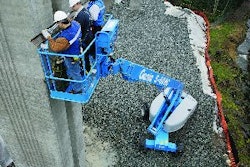Visiting with a contractor recently, I was reminded of some of the not-so-fun things contractors and construction leaders must do. The not-so-fun things like letting a long-term employee go due to his decreasing performance, or having to hold a customer accountable to what was agreed to in a contract, or to not allowing an employee to take off a few days due to your schedule needs even after you had OK'd his time off.
I call these examples, and certainly others that might be more painful or uncomfortable, the "casualties of construction." These are not illegal, immoral or unethical events but decisions a leader is confronted with and must address.
The realities of construction casualties reminded me how important it is for owners or leaders to have a good handle on their values, their view of business and their realistic outlook on making their businesses successful. Let me share a few insights into what many effective contractors do to handle some of the more unpleasant decisions that must be made.
1. Be true to your personal mission. No owner or leader can feel like his "life's mission" or purpose is being trashed. A leader must be firm, not arrogant, in his commitment to treat people with respect and to understand that not everyone else in the world will agree with his mission. That's OK; let the others in your life construct their own missions.
2. Develop a strategic plan for running your company. Even non-owners who are still leaders need a clear view of how they want to lead their organizations or their part of the organization. I love the Old Testament perspective of this insight which says, "Where there is no vision, the people perish." Most "followers" in our companies are drawn to leaders with a vision and a plan. Having such a strategic plan keeps you grounded and provides a reminder when things get cloudy.
3. Communicate honestly, objectively and as accurately as possible. This is a toughie for many leaders. How do you tell an employee who has been with you for 20 plus years his or her performance isn't making the grade? This can be tough; however, it is important to carefully spell out to employees what you need from them and how they are doing in delivering the need. It is important to be honest and critical but also objective. Objective feedback suggests you consider all sides of an issue. Allow others to provide feedback that may not always agree with your perspective. Just allowing others to sound off to you can strengthen their respect for you. Finally, being accurate is the last critical piece. No one likes to be given the wrong information for any reason. Accuracy implies you are separating facts from myths and rumors.
4. Deal with confusion or concerns professionally and promptly. It is amazing how strong the rumor mill can be in most construction companies. I've seen just as much confusion in a small company of 10 employees as I have in a company of 500 employees. What employees don't understand or are confused about often becomes fodder for the expansion of rumors. When such confusion is present, it is the leader who must address this head-on. State the truth and facts as clearly as possible. If the confusion or concern has a touch of confidentiality built in, then certainly be sensitive to the confidential issue. But if there is no issue here, then clarify the confusion and move on.
Dealing professionally and promptly suggests that you never assign blame to an individual, that is, at least publicly. Stay calm and collected. Don't let the confusion or problems of others rattle your emotional cage and begin to lower your own behavior to less than professional. Such demonstrations often leave the leader looking guilty of covering up some point of interest to others.
5. Turn problematic situations into positive turn-about. This doesn't require you be an eternal optimist, but it will require you to consider what good can come out of a difficult situation. For instance, a better than average worker quits your firm, and those who worked with the individual are uneasy about the future. Immediately consider sharing with those employees still with you of the opportunities that now exist for someone to step up or for some new approaches to be considered that may have been resisted in the recent past. Many employees are drawn to the leader who not only puts a positive spin on a bad issue but is proactive enough to say, "OK, folks, let's quit feeling sorry for ourselves, roll up or sleeves and get with the program!"
Certainly a leader deals with thousands of decisions a day, certainly in the span of a week. And the manner in which you, as the leader, respond to each and every opportunity is the chance to make a well thought out and prepared decision. I often refer to construction owners and leaders as quarterbacks who must be prepared to "audible" at the line of scrimmage if faced with a defense that poses a problem to success.
You are the quarterback. The "defense" facing you consists of the daily problems and challenges that you must adjust to in order to put your crew or company in the best position to win. Like a quarterback, you don't have a lot of time to react to situations. You must respond in a timely manner with the best "play" possible to reinforce to your followers that you understand the situation and have the best corrective action possible.
Brad Humphrey will present eight different seminars at the World of Concrete. Plan on attending one or more of Brad's sessions to find more secrets and techniques to being the best leader you are capable of being! Brad is president of Pinnacle Development Group, a consulting source to the construction industry. For more information, visit http://www.pinnacledg.com.




















